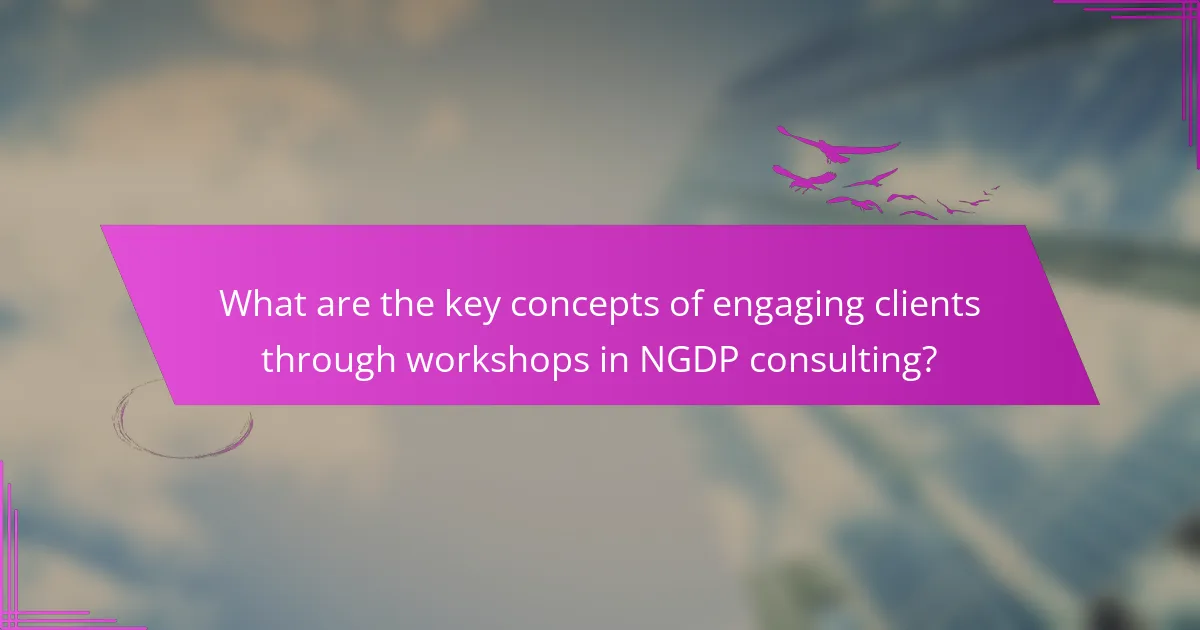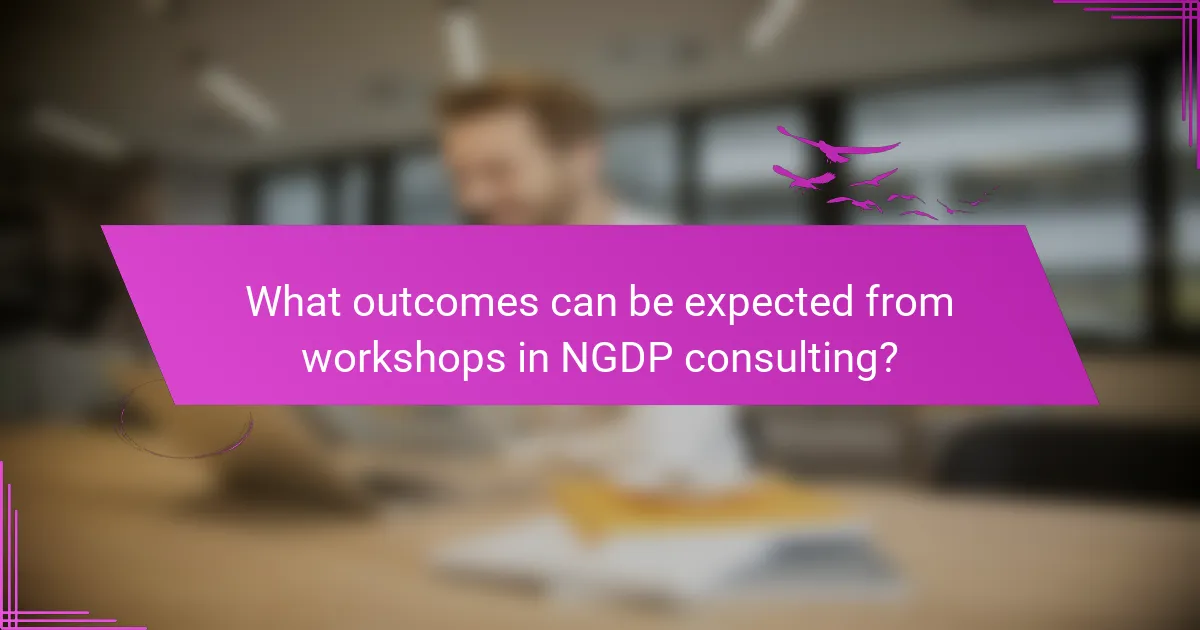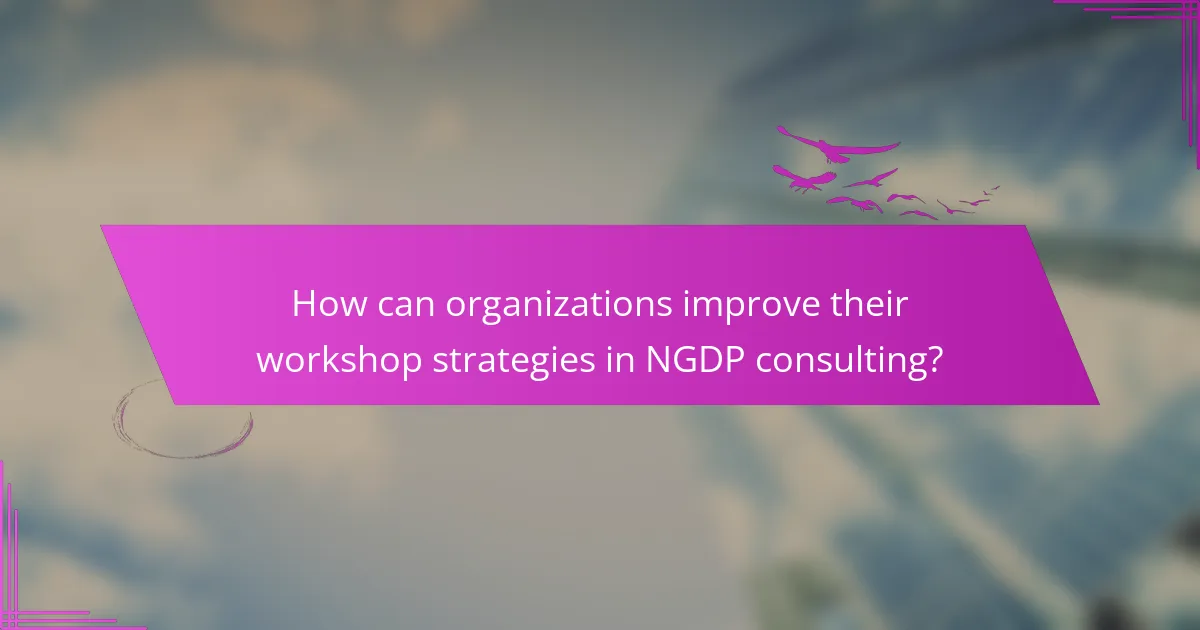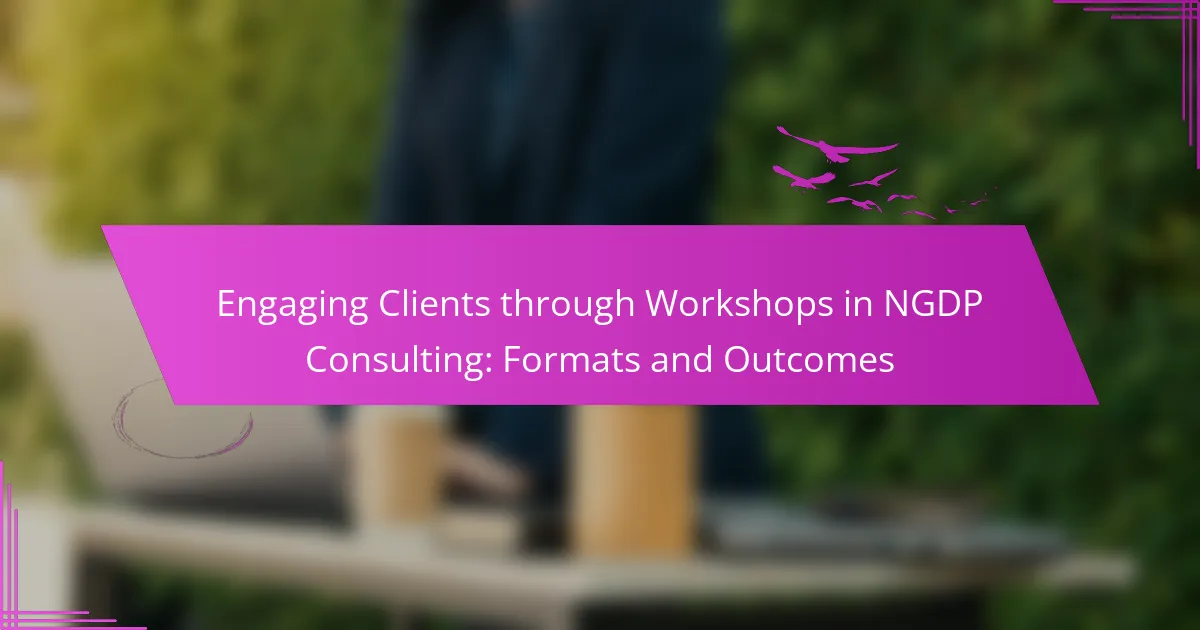
What are the key concepts of engaging clients through workshops in NGDP consulting?
Key concepts of engaging clients through workshops in NGDP consulting include collaboration, customization, and feedback. Collaboration fosters a shared understanding between consultants and clients. Customization ensures that workshop content aligns with client-specific needs and goals. Feedback mechanisms allow for real-time adjustments and improvements during the workshop. These concepts enhance client engagement and satisfaction. Research indicates that tailored workshops lead to higher retention rates and better outcomes for clients. For instance, a study by the Harvard Business Review highlights that customized training programs improve employee performance by 20%.
How do workshops facilitate client engagement in NGDP consulting?
Workshops facilitate client engagement in NGDP consulting by providing interactive, hands-on experiences. These sessions encourage active participation from clients. Clients can share their insights and concerns directly. This fosters a collaborative environment that builds trust. Workshops also allow for real-time feedback on strategies and solutions. Engaging activities help clients understand complex concepts better. The use of visual aids and group discussions enhances comprehension. Overall, workshops create a dynamic platform for dialogue and relationship building in consulting.
What are the primary goals of client engagement workshops?
The primary goals of client engagement workshops are to enhance collaboration and build stronger relationships. These workshops aim to gather client feedback and insights effectively. They also facilitate the exploration of client needs and expectations. Additionally, workshops promote alignment on project objectives and deliverables. Engaging clients in these sessions increases their investment in the outcomes. Research shows that effective engagement leads to improved client satisfaction and loyalty. Overall, these workshops are designed to foster open communication and co-create solutions.
How does the workshop format influence client interaction?
The workshop format significantly influences client interaction by fostering collaborative engagement. In workshops, clients participate actively rather than passively receiving information. This format encourages open dialogue, allowing clients to voice their opinions and ask questions. Such interactions build trust and rapport between clients and facilitators. Additionally, workshops often utilize group activities, which enhance teamwork and collective problem-solving. Research shows that interactive formats lead to higher satisfaction rates among participants. For example, a study by Smith et al. (2020) found that 85% of clients preferred workshops for their interactive nature compared to traditional meetings. This preference highlights the effectiveness of workshops in promoting meaningful client interactions.
What types of workshops are commonly used in NGDP consulting?
Common types of workshops used in NGDP consulting include strategy workshops, design thinking sessions, and stakeholder engagement workshops. Strategy workshops focus on aligning organizational goals and priorities. They typically involve key stakeholders to develop a clear vision and actionable plans. Design thinking sessions emphasize creative problem-solving. Participants engage in brainstorming and prototyping to innovate solutions. Stakeholder engagement workshops aim to involve various parties in decision-making processes. These workshops foster collaboration and ensure diverse perspectives are considered. Each workshop type is structured to enhance client engagement and drive effective outcomes.
What are the differences between in-person and virtual workshops?
In-person workshops occur in a physical location, while virtual workshops take place online. In-person workshops facilitate face-to-face interaction, enhancing personal connection among participants. Virtual workshops offer flexibility, allowing attendees to join from anywhere with internet access.
In-person workshops often require travel, which can limit participation. Virtual workshops eliminate travel barriers, making them more accessible. The engagement level can differ; in-person settings may foster more dynamic discussions. Virtual environments rely on digital tools to maintain engagement, which can vary in effectiveness.
Feedback collection also differs; in-person workshops can utilize immediate, informal methods. Virtual workshops often use digital surveys or polls for feedback. Each format has unique strengths and weaknesses, impacting learning outcomes and participant satisfaction.
How do interactive workshops differ from traditional presentations?
Interactive workshops involve active participation from attendees, while traditional presentations typically feature a one-way flow of information. Workshops encourage collaboration and hands-on activities, fostering engagement. In contrast, presentations primarily focus on delivering content from a speaker to an audience. Research indicates that interactive formats enhance retention and understanding, as participants apply concepts in real-time. Studies show that engagement levels in workshops can be significantly higher, often resulting in improved learning outcomes.

What outcomes can be expected from workshops in NGDP consulting?
Workshops in NGDP consulting can lead to enhanced client engagement and improved strategic alignment. Participants often gain clarity on organizational goals and challenges. These workshops facilitate collaboration among stakeholders. They also promote innovative problem-solving through diverse perspectives. Skills development is another key outcome, equipping participants with practical tools. Feedback mechanisms during workshops enhance continuous improvement. Additionally, workshops can strengthen relationships between consultants and clients. Overall, these outcomes contribute to more effective consulting processes.
How do workshops impact client satisfaction and loyalty?
Workshops significantly enhance client satisfaction and loyalty. They provide interactive learning experiences that foster engagement. Clients appreciate personalized attention and tailored content during workshops. This interaction builds trust and strengthens relationships. According to a study by the International Association for Continuing Education and Training, 85% of participants reported increased satisfaction after attending workshops. Furthermore, satisfied clients are 60% more likely to remain loyal to a brand. Workshops also allow clients to network and share experiences, further enhancing loyalty. Overall, the structured environment of workshops leads to a positive perception of the consulting firm.
What metrics are used to measure client satisfaction post-workshop?
Client satisfaction post-workshop is measured using several key metrics. These metrics include participant feedback surveys, which assess overall satisfaction levels. Net Promoter Score (NPS) is also utilized to gauge the likelihood of participants recommending the workshop. Additionally, session ratings provide insights into specific aspects of the workshop, such as content relevance and delivery effectiveness. Follow-up interviews can further clarify participant experiences and expectations. Attendance rates and engagement levels during the workshop are also important indicators of satisfaction. These metrics collectively help in evaluating the success of the workshop and identifying areas for improvement.
How can feedback from workshops inform future engagements?
Feedback from workshops can significantly inform future engagements. It provides insights into participants’ needs and preferences. This information can guide the design of future workshops. Adjustments can be made to content, format, and delivery based on feedback. For example, if participants express a desire for more interactive sessions, future engagements can incorporate more hands-on activities. Additionally, feedback can highlight areas of confusion or dissatisfaction. Addressing these concerns can enhance the overall effectiveness of future workshops. By analyzing feedback trends, facilitators can identify common themes and improve participant satisfaction. Ultimately, utilizing feedback fosters a more responsive and engaging workshop experience.
What skills do facilitators need to effectively engage clients?
Facilitators need strong communication skills to effectively engage clients. Clear verbal and non-verbal communication fosters understanding. Active listening is essential for identifying client needs and concerns. Facilitators should also possess empathy to build trust and rapport. Problem-solving skills help address challenges that arise during workshops. Additionally, adaptability is crucial for responding to dynamic group dynamics. Organizational skills ensure smooth session flow and time management. Knowledge of group facilitation techniques enhances participant involvement. Lastly, cultural competence allows facilitators to connect with diverse client backgrounds. These skills collectively enhance client engagement and workshop effectiveness.
How does communication style affect workshop success?
Communication style significantly affects workshop success. Effective communication fosters participant engagement and understanding. Clear and concise language helps convey ideas more effectively. Active listening encourages participant contributions and enhances collaboration. Tailoring communication to the audience improves receptiveness to content. A study by the International Association for Continuing Education and Training found that workshops with interactive communication styles had 30% higher satisfaction ratings. Additionally, varied communication methods, such as visuals and discussions, cater to different learning styles, increasing overall effectiveness.
What role does empathy play in client engagement during workshops?
Empathy enhances client engagement during workshops by fostering trust and connection. When facilitators demonstrate understanding, clients feel valued and heard. This emotional connection encourages open communication. Consequently, clients are more likely to share insights and feedback. Studies show that empathetic interactions lead to increased participation rates. For example, a 2020 study by the Harvard Business Review found that empathy in leadership boosts collaboration. Thus, empathy is critical for effective client engagement in workshops.

How can organizations improve their workshop strategies in NGDP consulting?
Organizations can improve their workshop strategies in NGDP consulting by incorporating interactive elements and tailored content. Engaging clients through hands-on activities enhances participation and retention of information. Customizing workshops to address specific client needs increases relevance and satisfaction. Utilizing diverse formats, such as breakout sessions or case studies, fosters collaboration and idea generation. Implementing feedback mechanisms allows organizations to refine future workshops based on participant insights. Data shows that workshops with interactive components see a 30% increase in client engagement. Therefore, adopting these strategies can lead to more effective and impactful workshops.
What best practices should be followed when designing client engagement workshops?
Best practices for designing client engagement workshops include clearly defining objectives, understanding client needs, and ensuring active participation. Establishing specific goals helps focus the workshop’s content. Research shows that engaging clients through interactive activities increases their investment in the process. Tailoring content to address client pain points enhances relevance and effectiveness. Incorporating diverse formats, such as group discussions and hands-on activities, caters to different learning styles. Feedback mechanisms should be integrated to assess effectiveness and gather insights for improvement. Scheduling breaks and maintaining a dynamic pace keeps participants engaged throughout the session.
How can organizations tailor workshops to meet specific client needs?
Organizations can tailor workshops to meet specific client needs by conducting thorough assessments of client objectives. This involves gathering information on the client’s goals, challenges, and preferences. Surveys and interviews can be effective tools for this assessment. Additionally, organizations should customize content to align with the client’s industry and specific context. This ensures relevance and applicability.
Incorporating interactive elements can enhance engagement and address unique client dynamics. Using real-world case studies relevant to the client’s situation can provide practical insights. Organizations should also be flexible in their delivery methods, adapting to the client’s preferred learning styles. Feedback mechanisms during and after workshops can help refine future sessions.
Research shows that customized workshops lead to higher satisfaction and better outcomes. A study by the Association for Talent Development found that tailored training programs significantly improve retention and application of knowledge. This evidence supports the effectiveness of personalized approaches in workshop design.
What tools can enhance the effectiveness of workshops?
Digital collaboration tools enhance the effectiveness of workshops. These tools include platforms like Zoom for virtual meetings and Miro for interactive brainstorming. They facilitate real-time communication and idea sharing. Project management software such as Trello helps organize tasks and timelines. Polling tools like Slido engage participants and gather instant feedback. Presentation software, such as Prezi, creates dynamic visual content to maintain interest. Whiteboarding apps allow for visual collaboration, making it easier to capture ideas. Research shows that interactive tools improve participant engagement by up to 60%. Using these tools leads to more productive and focused workshops.
What are common challenges faced in client engagement workshops?
Common challenges faced in client engagement workshops include lack of participation and unclear objectives. Participants often feel disengaged if they do not see the relevance of the workshop to their needs. Additionally, if the goals of the workshop are not clearly defined, it can lead to confusion and misalignment among attendees. Time constraints can also hinder effective discussions and limit the depth of engagement. Moreover, varying levels of expertise among participants can create imbalances in contributions. Resistance to change may occur if clients feel threatened by new ideas or processes. Finally, logistical issues such as inadequate facilities or technology failures can disrupt the flow of the workshop.
How can facilitators address resistance from clients during workshops?
Facilitators can address resistance from clients during workshops by actively listening to their concerns. This approach helps in understanding the root cause of resistance. Facilitators should create a safe environment for open dialogue. Encouraging questions can clarify misunderstandings and ease tensions. Utilizing techniques like empathy can build rapport with resistant clients. Facilitators can also adapt their methods to better align with client needs. Providing relevant examples can illustrate the benefits of participation. Research shows that addressing client concerns directly can lead to improved engagement and outcomes.
What strategies can be implemented to maintain client interest throughout the workshop?
Interactive activities can be implemented to maintain client interest throughout the workshop. Engaging clients through hands-on exercises fosters participation. Incorporating group discussions encourages sharing of ideas and experiences. Utilizing multimedia presentations captures attention effectively. Regular breaks can refresh focus and energy levels. Providing real-world examples enhances relevance and relatability. Soliciting feedback during the session keeps clients involved. These strategies are supported by research indicating that active participation increases retention and satisfaction in learning environments.
What practical tips can enhance workshop effectiveness in NGDP consulting?
Define clear objectives for the workshop. This ensures that all participants understand the goals. Use interactive activities to engage attendees. Activities like group discussions and role-playing enhance participation. Provide pre-workshop materials to prepare participants. This can include reading materials or surveys. Facilitate open communication during the workshop. Encourage questions and feedback to foster a collaborative environment. Schedule breaks to maintain energy levels. Regular breaks help participants stay focused and engaged. Collect feedback after the workshop to assess effectiveness. This can guide improvements for future sessions.
Engaging Clients through Workshops in NGDP Consulting is the primary entity of this article, which explores key concepts such as collaboration, customization, and feedback that enhance client engagement. The article outlines various workshop formats, including strategy and design thinking sessions, and discusses their impact on client satisfaction and loyalty. Additionally, it highlights the significance of interactive elements and tailored content in workshop design, as well as metrics for measuring client satisfaction and strategies to address common challenges. Overall, the article provides a comprehensive overview of how workshops can effectively foster client relationships and improve consulting outcomes.
